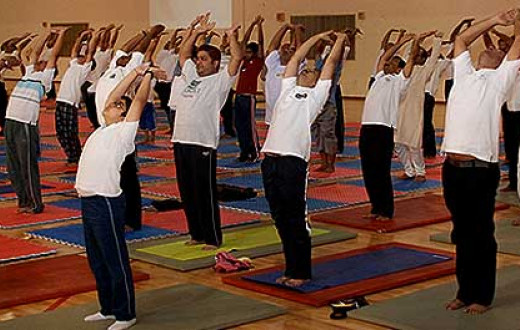Contd from Knowledge Sheet 13
vitarkavicārānandāsmitārupānugamāt saṁprajñātaḥ ॥17॥
वितर्कविचारानन्दास्मितारुपानुगमात् संप्रज्ञातः ॥१७॥
In the state of conscious awareness or saṁprajñātaḥ samadhi, special logic is accompanied by thoughts, by bliss and the experience of just ‘I am’.
- Patañjali Yoga Sutra 1.17
What is the purpose of sādhana?
Tarka means logic.
Kutarka means wrong logic. When the intention is not right and logic is applied only to find fault; when you know deep inside you that something is not right, but you still logically prove that it is right, it is kutarka.
Vitarka is specialized logic. It is not normal logic. When you just say, ‘Who am I?’ it is a thought but this thought that leads you to infinity and self-knowledge is vitarka. ‘What is this universe?’ You don't get the answer, but this question, ‘What is this universe?’ is called vitarka. So, this qualified logic that comes up and takes you right back to the Self is one type of samādhi. Certain thoughts that we have, certain suggestions that we give in a guided meditation, take us into deep samādhi.
Now, this knowledge of yoga sutras that we are discussing is vitarka or special logic. What is happening? Logically, you understand this knowledge. Even reading or talking about this has a certain effect on our consciousness. It elevates your consciousness. This is samādhi. Sam means equanimous; Dhi is the intellect or this faculty of consciousness that sustains you. Now, we are in a state of samādhi because we are talking about the Self with a definite logic.
Four types of meditative states or samâdhi
When there is self-enquiry but no thought, it is vitarkanugamā samādhi. I am not giving any suggestions, but I tell you to ask yourself a question, ‘Who am I?’ Then, you sit with your eyes closed and drop down into samādhi. This is vitarkanugamā samādhi.
When I say, ‘Now, sit with your eyes closed and listen to the fan, listen to the birds chirping,’ you keep listening to these words. These lead to vichāranugamā samādhi. Your mind is in equanimity, but thoughts are coming and going within. When I say, 'Now, your body is all hollow and empty,' this is a thought. With this thought, you get into an empty space. Through thought, you get into samādhi.
In vichāra, there are experiences of smell, sight, vision, taste, or sounds. When you meditate, observe the thoughts that come and go. There are two states of mind that often surface in you. One is a thought which disturbs you and the other is a thought that does not disturb you, but just hovers around in your consciousness and you are aware of it. You are in samādhi, in an equanimous state of mind and at the same time, there are thoughts hovering. It is a part of meditation - thoughts exist, experiences exist.
Ānandanugama samādhi happens when a bhajan is being played and you feel so blissful that you don't even want to open your eyes. You dissolve in that music; you are in a blissful state. Have you noticed that after you do Sudarshan Kriyā, you are in a different space? The mind is still elevated. The consciousness is still elevated and equanimous but it is in ecstasy. That is ānanda. You feel very happy. Happiness leads you to a space of void or samādhi.
Asmitā anugamā samādhi is when in deep meditation you just feel you are, but you don't know where you are. Just the feeling, 'I am' exists, nothing else. Without any of the characters or roles you play and the qualifications you have, you simply experience ‘I am'. All other characteristics of your personality are shed. It is commonly translated as ego, but it is not the ego, it is ‘I am’-ness; being aware of the presence. This is asmitā anugamā samādhi.
All these four are called, saṁprajñāta, which means that there is consciousness in all this. There is an outflow of awareness throughout.
How to Achieve the States of Samadhi >>
(This is part of a series of knowledge sheets based on Gurudev Sri Sri Ravi Shankar's commentaries on Patanjali Yoga Sutras.)





















